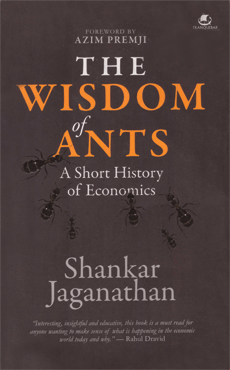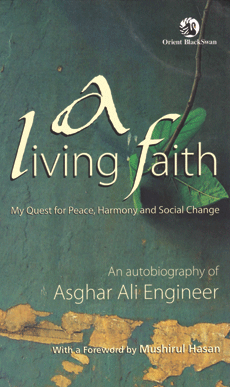The Wisdom of Ants: A Short History of Economics by Shankar Jaganathan; Westland Tranquebar; Price: Rs.295; 366 pp
 This is a truly extraordinary book — a disciplined effort of scholarship and research written in an engaging style — which all individuals interested in the complex and often confusing subject that is economics, should read.
This is a truly extraordinary book — a disciplined effort of scholarship and research written in an engaging style — which all individuals interested in the complex and often confusing subject that is economics, should read.
The chief merit of The Wisdom of Ants, who according to the famous fable, worked industriously and saved while the neigbouring grasshoppers’ community sang and danced the summer away only to suffer grievously in winter, is that it provides a valuable, easily comprehensible historical overview of the now dominant social science known as economics. Contrary to popular belief, economics was accepted as a social science less than 250 years ago when the famous British economist Adam Smith wrote his landmark An Inquiry into the Nature and Causes of the Wealth of Nations in 1776.
The heart of this scholarly book distinguished by its wide sweep, is the 112-page focus on ‘A Short Biography of Economics’. Tracing the birth and evolution of this science over the period 400 BCE (before Christ era formerly BC) to 2009, the author divides this long time span into four periods.
The first era from 400 BCE to 1500 CE (formerly AD), constitutes the “long infancy” of economics, when it was “ethically immersed” and heavily influenced by religious precepts and practice. During this period, private property became acceptable “but social consent for self-centred individualistic behaviour was not yet conceded”. In this chapter the views on commerce of great thinkers and philosophers of the 14th century are detailed. The perspectives of Aristotle, Xenophon, author of Oikonomia (translation: The Economist), Kautilya, Chinese philosopher-statesman Lord Shang, and professor, principal and judge Muhammad Ibn Khaldun on business and trade are presented.
The next epoch in the evolution of this social science, observes Jaganathan, was the period 1300-1776, described as the “brief childhood of economics” when it was “socially shackled” by Christian doctrine and dogma in Europe, whose hitherto backward nations transformed into dominant global powers. In the author’s view, the Black Death plague that swept across Europe between 1348-50 wiping out a quarter of the continent’s population almost overnight, created a shortage of labour “which resulted in a shift in the rural workforce from serfdom to paid labour”, thus raising standards of living and promoting “the gradual shift, even in the rural economy, away from the barter system to money-based exchanges”.
Simultaneously, a growing number of people began to understand that the series of epidemics that caused perhaps the greatest demographic disaster in human history, was not the consequence of divine displeasure, but of the neglect of sanitation and hygiene. “Logical decisions started to displace faith and authority, which had hitherto ruled the day, in a small way. In commercial life, it emerged in the concept of prudent economic reason,” writes Jaganathan.
Economics flowered into an academic subject under the formative influence of Adam Smith who penned his watershed The Wealth of Nations in 1776. The era ending 1929 when the Wall Street crash ushered in the Great Depression which threw almost 30 million people out of work and precipitated a global crisis, was the period when under the influence of classical economists Ricardo and Malthus who discovered the factors of production (land, labour, capital), Austrian economists Carl Menger and Ludwig Von Mises (who added entrepreneurship) and John Stuart Mill, liberal or market-based economics developed into a full-fledged and respected social science. Yet during this period, market-based economics (aka capitalism), was challenged by Karl Marx in Das Kapital (1887), who disputed the prime importance accorded to capital as a factor of production, insisting on the primacy of labour. The communist revolution in Russia which was soon followed by the Great Depression in Western nations, marked the end of the era of classical market economics. Thereafter state intervention and regulation supported by renowned economist John Maynard Keynes, became the accepted norm.
The crisis of capitalism triggered by the Great Depression of 1929-34 ushered in the fourth era in the history of economics (1929-2009) — an “ideologically designed rich adulthood” according to Jaganathan’s analysis. In this concise 36-page chapter, the author deftly traces the decline in popularity of Keynesian economics, the ennoblement of economics as the dominant social science by the Nobel Foundation, the resurrection of the Chicago School of free markets economics, the emergence of the Washington Consensus of 1989 and excessive deregulation of banks which led to the economic crisis precipitated by the collapse of the investment banking giant Lehman Brothers in 2008.
Part III spanning 120 pages and titled ‘Looking Ahead’ constitutes the other half of The Wisdom of Ants, wherein the author visualises the evolutionary future of this social science. Starting with a chapter on how and why the Alfred Nobel Foundation conferred primacy on economics by instituting the Nobel Prize for the subject in 1969, Jaganathan proceeds to examine the question whether economics is a hard/exact value-neutral or values-based science, giving considerable space to communism and The Communist Manifesto which questioned — indeed abolished — private property, the main pillar of economics. Also included in this section is a hot button issue of our time — rising income inequality and ways and means to move towards “economic democracy”. And in the very last chapter of this book titled ‘Postscript: Reflections and Conclusion’, the vital question of “the advantage derived from choosing between free markets and a more restrained socially conscious system of exchange of goods and services”.
Unfortunately, constraints of space don’t permit evaluation of the stimulating arguments advanced in this enlightening study about the future direction of the still evolving science that is economics. However The Wisdom of Ants proves beyond all doubt that economic doctrine and policies will play an ever larger role in shaping the lives of future generations. This is the most compelling reason to read this insightful history of economics.
Dilip Thakore
Timely memoir
A Living Faith: My Quest for Peace, Harmony, and Social Change by Asghar Ali Engineer; Orient Black Swan; Price: Rs.395; 345 pp
 Asghar Ali Engineer who died recently was well known in social activist circles, in India and abroad as an individual who spent his entire life trying to promote inter-communal harmony. He is also remembered as an innovative Islamic thinker who developed interpretations of his religion in response to contemporary human rights sensibilities and widespread human rights violations by those who claim to be Islam’s champions and defenders. A prolific writer, even into his seventies he continued to travel in India and abroad, to promote better understanding and relations between his fellow Muslims and people of other faiths.
Asghar Ali Engineer who died recently was well known in social activist circles, in India and abroad as an individual who spent his entire life trying to promote inter-communal harmony. He is also remembered as an innovative Islamic thinker who developed interpretations of his religion in response to contemporary human rights sensibilities and widespread human rights violations by those who claim to be Islam’s champions and defenders. A prolific writer, even into his seventies he continued to travel in India and abroad, to promote better understanding and relations between his fellow Muslims and people of other faiths.
Engineer’s account of his early life as recounted in this timely memoir completed two years before his death, is riveting. He recounts, albeit too briefly, his childhood in a lower-middle class family in a small town in Madhya Pradesh, and being educated in government-run Urdu and Hindi-medium schools. Life for the son of a mullah or priest of the Bohra sect of Shia Muslims was by no means easy. The community is deeply conservative. Although fairly prosperous, the Bohras, according to Engineer, lived under craven conditions, ruled by the Syedna, the Bohra head-priest, who considers himself absolute lord and master. The Syedna’s every word was — and still is — accepted as divine command by his followers.
It was the Syedna’s autocracy, Engineer reveals, which aroused deep aversion of injustice within him. Engineer’s account of the rise of the Bohra reformist movement, which demanded intra-community democracy, curtailing the dictatorship of the Syedna and scrapping of a slew of parallel laws and taxes he has imposed on the community, is deeply moving, highlighting the courage that drove him and a small band of reformers to take on the all powerful and wealthy Syedna and Bohra establishment. Many among the pioneer reformists, including Engineer, were excommunicated from the Bohra fold. For his relentless mission in galvanising the movement, Engineer had to pay a heavy price: several attempts on his life by orthodox Bohras and the Syedna’s rabid followers.
Throughout his life, Engineer was also a committed supporter of inter-community relations in India, and his memoirs devote several pages to critiquing communalism through his voluminous writings on the subject, and workshops to promote communal harmony. Not everyone will, however, agree with Engineer’s diagnosis of the communal problem in India. He somewhat naively argues that religion per se is not divisive, and that religious hatred and bitterness is politically motivated. In his opinion Islam preaches love, mercy, compassion and commitment and he denounces the all-too-common obsession with dogma and supremacism that is almost universal among different brands of religion, particularly Islam.
The bulk of Engineer’s autobiography — almost two-thirds of the book — is a chronicle of his travels in the West, Asia and Africa which he visited to attend conferences on religion, particularly on Islam, radicalism and inter-faith relations. (Curiously, the book doesn’t even mention Engineer’s extensive travels within India). Here, we learn about his efforts at the international level, in which Engineer played an active role, to promote inter-religious dialogue for more humane interpretations of religion, to counter terrorism in the name of Islam and to build bridges between people of different religious faiths.
After devoting more than 200 pages describing his travels abroad to deliberate issues pertaining to religion in the contemporary world, Engineer spares less than ten pages to wind up his memoir. In a section titled ‘Looking Back, Looking Ahead’, he reflects on what he sees as the purpose of his life — achieving social justice, promoting inter-communal harmony, world-healing, and so on.
All this is very laudable, and the reader can’t be left unimpressed by Engineer’s many intellectual achievements and activities. Yet, this section appears all too brief, inadequate and abrupt. Given that the greater part of the book is about the author’s wealth of experience on the international conference circuit, some readers are bound to notice the lack of any reflection on the usefulness or otherwise of such efforts, in terms of practical achievement and transforming people’s hearts and minds.
But despite this, Engineer’s just-in-time memoir, is in parts, powerfully inspiring, revealing a heroic individual who devoted his life to causes in which he believed.
Yoginder Sikand



























